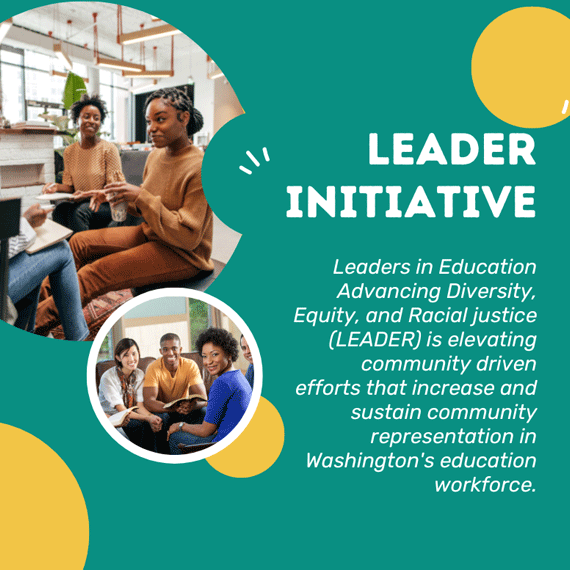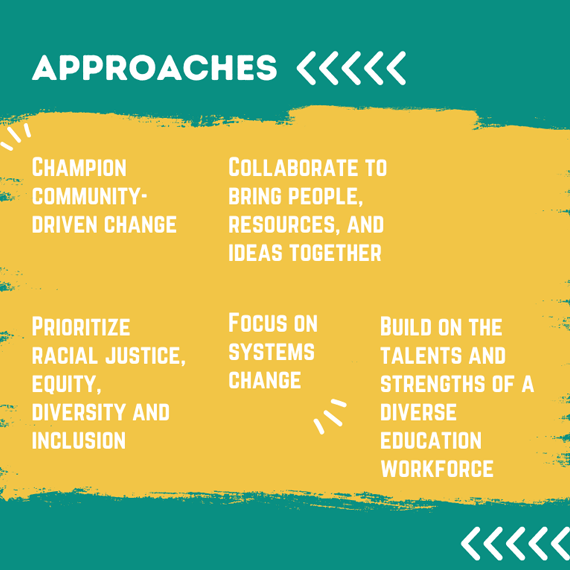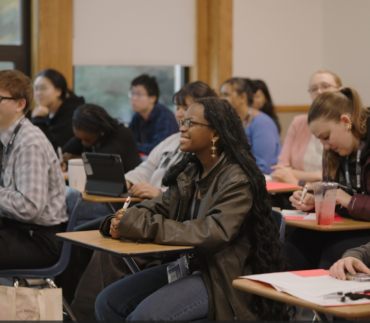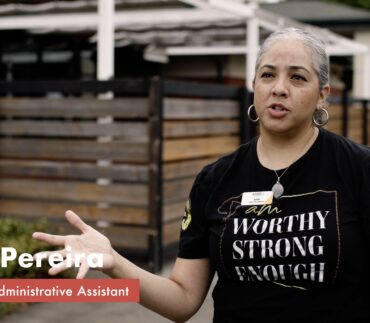
LEADER Selects Ten Regional Leads to Help Advance Community-Driven Efforts to Increase and Sustain a Diverse Education Workforce
Ten Regional Leads have been selected to support regional coalitions working to identify community priorities, gaps, opportunities and develop plans to address some of the systemic issues that have led to an education workforce that does not reflect the diversity of Washington’s students.
The Regional Leads are:
- NorthEast Washington ESD 101
- Educational Service District 105
- Educational Service District 112
- Capital Region ESD 113
- Puget Sound ESD 121
- Northwest ESD 189
- UW-Bothel/City U
- Central Washington University
- Technology Access Foundation
- Washington Ethnic Studies Now (WA-ESN)
Regional collaborative groups include Education Service Districts (ESDs), school districts, principals, educator prep programs, students, families, community organizations, and tribes.
Initiative funds will support several LEADER collaborations in the Puget Sound (121) and Northwest (189) ESD regions, which are the two largest ESDs in the state by student population.
Washington Ethnic Studies Now (WA-ESN) submitted a Regional Lead proposal focused on establishing an ethnic studies teaching credential, a more narrow focus of work than convening partners to advance the LEADER goals more broadly. Because the ethnics studies credential is a LEADER aligned strategy that may draw more BIPOC individuals toward education, and because WA-ESN serves as the hub for a large, statewide BIPOC Educator network, they were selected to be included in the LEADER Initiative.
We did not receive any Regional Lead applications from organizations located in ESD 114 or 123. However, we are working with neighboring Regional Leads to ensure that any school districts in ESD 114 and 123 that are interested in working toward LEADER goals are able to connect with nearby regions, and we will invite these districts to participate in statewide LEADER events.


The LEADER Initiative focuses on increasing and sustaining BIPOC community representation in teaching and educational leadership while working to advance changes in policy, practice, and institutional culture that support these goals and amplify equity and racial justice across the education system. Our focus on increasing community representation among teachers and leaders grows from our commitment to advance the priorities of students and families, who frequently speak of the urgent need for a more diverse education workforce. The initiative framework is based on discussions with partners in alignment with our values of learning from others, authentic partnership, and supporting ally-devised solutions.
Over a two-year planning phase, these groups will engage in asset mapping and regional needs assessment focused on recruiting, preparing, sustaining, and promoting BIPOC educators across the educator career continuum with an emphasis on secondary teachers and principals that reflect school communities. Depending on regional priorities, the process may also include assessment of educator prep programs’ alignment with equity principles as well as district practices related to equity plans & training, human resources, culturally relevant teaching & learning, and school climate as all are interwoven with the educator career continuum and the larger goal of transforming education systems.
“Our focus on increasing community representation among teachers and leaders grows from our commitment to advance the priorities of students and families, who frequently speak of the urgent need for a more diverse education workforce.”
These regional groups will be connected as a state-wide learning community, coming together regularly to learn from each other and engage in professional development focused on information sharing, promising practices, and strategies that advance initiative objectives grounded in anti-racism, equity, and multiculturalism.
Following the planning phase, grant funding will support a subset of regions to advance priorities identified and developed during the planning phase. All regions will continue to be part of the statewide learning community throughout the initiative.



